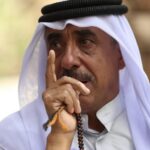Trump trial: Prosecution says hush money was ‘pure election fraud’
During the hush-money trial involving former President Donald Trump, the prosecution alleged that he engaged in a criminal conspiracy and cover-up to conceal a sex scandal before the 2016 presidential election.
According to a lawyer representing the prosecution, who spoke during opening statements at the trial in New York, the actions amounted to election fraud.
In contrast, Trump’s defense attorney asserted that his client had committed no crimes and emphasized that attempting to influence an election was not illegal.
The charges against Trump stem from accusations of orchestrating a $130,000 payment to adult film actress Stormy Daniels, also known as Stephanie Clifford, prior to his election victory.
Trump denies the allegations, including any sexual encounter with Daniels, and has pleaded not guilty to 34 counts of falsifying business records.
At the outset of the trial’s second week, both sides presented their cases to the jury. The prosecution argued that Trump directed his former lawyer, Michael Cohen, and the Trump Organization’s CFO, Allen Weisselberg, to manipulate financial records related to the payment to Daniels.
Prosecutors contended that Trump’s motive for the cover-up was to prevent voters from learning about the alleged encounter with Daniels, thereby constituting election interference.
They claimed that revelations such as the Access Hollywood tape, where Trump boasted about his fame enabling him to engage in sexual activities, had alarmed his campaign, and Daniels’ public accusations exacerbated the situation.
The defense sought to discredit Cohen as an unreliable witness, highlighting his criminal convictions, and dismissed Daniels’ credibility by emphasizing her financial gain from the allegations.
Trump’s attorney argued that even if Trump sought to influence the election, it was not unlawful, as it falls within the realm of democracy.
The trial is expected to last about another six weeks, but legal experts say opening statements are particularly important as an opportunity to shape jurors’ views on the case.
“You need to start out strong in a case like this,” former federal prosecutor Neama Rahmani told the BBC.
Mr Rahmani noted that the prosecution’s efforts to elevate this to an election interference case may be tough with a jury that includes two lawyers.
“It’s clear the records were false business records, but to take that next step to prove they were in furtherance of, or to cover up, a campaign finance contribution, is a more difficult legal argument and they’re going to need to do a lot more than that in my opinion.
“This is going to come down to Michael Cohen,” he concluded, and whether his testimony backs up what he has said in the past and whether he has documents to prove it.


